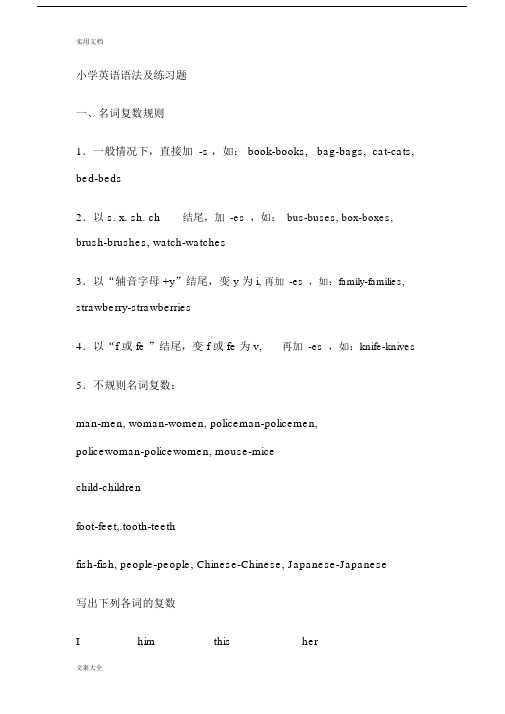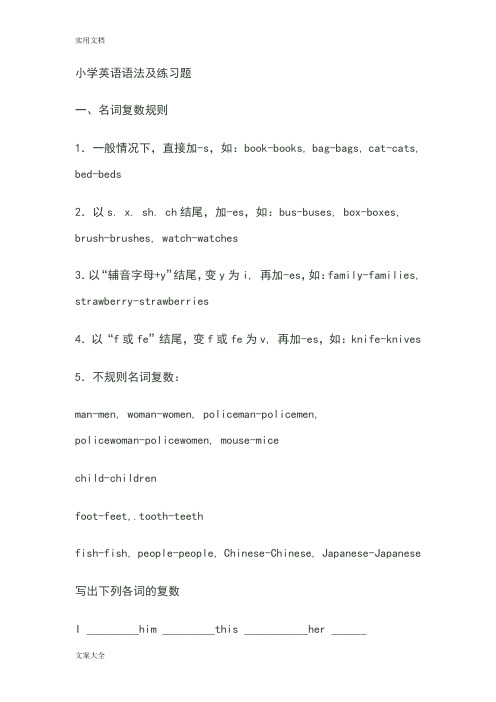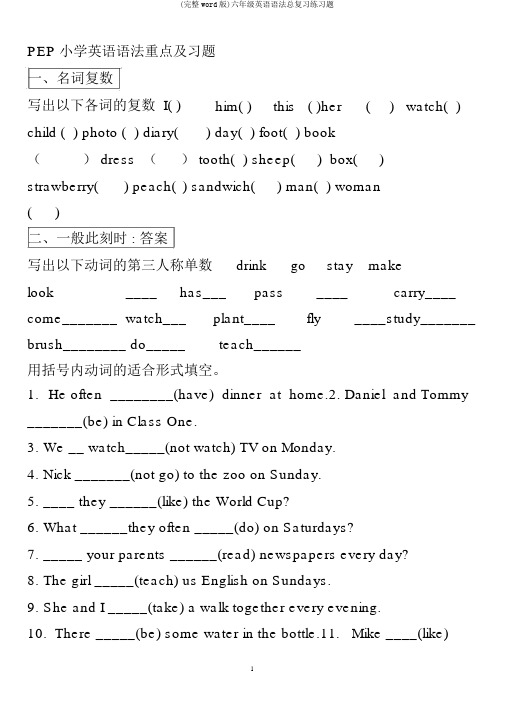【新版】小学英语六年级总复习语法及练习题(一)
(完整)小学英语六年级总复习语法及练习题(一).docx

小学英语语法及练习题一、名词复数规则1.一般情况下,直接加 -s ,如: book-books, bag-bags, cat-cats, bed-beds2.以 s. x. sh. ch结尾,加-es,如:bus-buses, box-boxes, brush-brushes, watch-watches3.以“辅音字母 +y”结尾,变 y 为 i,再加-es,如:family-families, strawberry-strawberries4.以“f 或 fe ”结尾,变 f 或 fe 为 v,再加-es,如:knife-knives 5.不规则名词复数:man-men, woman-women, policeman-policemen,policewoman-policewomen, mouse-micechild-childrenfoot-feet,.tooth-teethfish-fish, people-people, Chinese-Chinese, Japanese-Japanese写出下列各词的复数I _________him _________this ___________her ______watch _______child _______photo ________diary ______day________ foot________ book_______ dress ________tooth_______ sheep ______box_______ strawberry _____thief _______yo-yo ______ peach______ sandwich ______man______ woman_______ paper_______juice___________ water________ milk________ rice__________ tea__________二、一般现在时一般现在时基本用法介绍【No. 1 】一般现在时的功能1. 表示事物或人物的特征、状态。
(word完整版)小学六年级英语语法要点及习题

小学英语语法要点及习题一、名词复数规则1.一般情况下,直接加-s,如:book-books, bag-bags, cat-cats, bed-beds 2.以s. x. sh. ch结尾,加-es,如:bus-buses, box-boxes, brush-brushes, watch-watches3.以“辅音字母+y”结尾,变y为i, 再加-es,如:family-families, strawberry-strawberries4.以“f或fe”结尾,变f或fe为v, 再加-es,如:knife-knives5.不规则名词复数:man-men, woman-women, policeman-policemen, policewoman-policewomen, mouse-mice ,child-children ,foot-feet,tooth-teeth,fish-fish, people-people, Chinese-Chinese, Japanese-Japanese 6.合成词单复数变化规则1)以不可数名词结尾的复合名词无复数形式。
例如:homework, newspaper等。
2)以man或woman为前缀的名词变复数时,前后两个名词都变成复数。
例如:woman doctor→women doctors, man waiter→men waiters.7.集体名词,以单数形式出现,但实为复数。
例如:people police等本身就是复数,不能说a people,a police,但可以说a person,a policeman,the English,the British,the French,the Chinese,the Japanese,the Swiss 等名词,表示国民总称时,作复数用,如The Chinese are industries and brave.中国人民是勤劳勇敢的。
小学英语六年级总复习语法及练习题(一).doc

小学英语语法及练习题一、名词复数规则1.一般情况下,直接加-s,如:book-books, bag-bags, cat-cats, bed-beds 2.以s. x. sh. ch结尾,加-es,如:bus-buses, box-boxes, brush-brushes, watch-watches3.以“辅音字母+y”结尾,变y为i, 再加-es,如:family-families, strawberry-strawberries4.以“f或fe”结尾,变f或fe为v, 再加-es,如:knife-knives5.不规则名词复数:man-men, woman-women, policeman-policemen,policewoman-policewomen, mouse-micechild-childrenfoot-feet,.tooth-teethfish-fish, people-people, Chinese-Chinese, Japanese-Japanese写出下列各词的复数I _________him _________this ___________her ______watch _______child _______photo ________diary ______day________ foot________ book_______ dress ________tooth_______ sheep ______box_______ strawberry _____thief _______yo-yo ______ peach______ sandwich ______man______ woman_______ paper_______ juice___________water________ milk________ rice__________ tea__________二、一般现在时一般现在时基本用法介绍【No. 1】一般现在时的功能1.表示事物或人物的特征、状态。
小学英语六年级总复习语法与练习题(一)

实用文档小学英语语法及练习题一、名词复数规则1.大凡情况下,直接加-s,如:book-books,bag-bags, cat-cats,bed-beds2.以s. x. sh. ch结尾,加-es,如:bus-buses, box-boxes,brush-brushes, watch-watches3.以“辅音字母+y”结尾,变y为i,再加-es,如:family-families,strawberry-strawberries4.以“f或fe”结尾,变f或fe为v,5.不规则名词复数:再加-es,如:knife-knives实用文档watch _______child _______photo ________diary ______day________foot________ book_______ dress ________tooth_______ sheep ______box_______ strawberry _____thief _______yo-yo ______ peach______ sandwich______man______ woman_______ paper_______juice___________water________ milk________ rice__________ tea__________二、大凡现在时大凡现在时基本用法介绍【No. 1】大凡现在时的功能实用文档1. be动词:主语+be(am,is,are)+I am a boy.我是一个男孩。
其它。
如:2.行为动词:主语+行为动词(+其它)。
如:We study English.我们学习英语。
当主语为第三人称单数(he, she,it)时,要在动词后加“-s“或“-es“。
如:Mary likes Chinese.大凡现在时的变化玛丽喜欢汉语。
1.be动词的变化。
否定句:主语+ be + not +其它。
(完整)小学英语六年级总复习语法及练习题(一)

小学英语语法及练习题一、名词复数规则1.一般情况下,直接加-s,如:book-books, bag-bags, cat-cats, bed-beds2.以s. x. sh. ch结尾,加-es,如:bus-buses, box-boxes, brush-brushes, watch-watches3.以“辅音字母+y”结尾,变y为i, 再加-es,如:family-families, strawberry-strawberries4.以“f或fe”结尾,变f或fe为v, 再加-es,如:knife-knives 5.不规则名词复数:man-men, woman-women, policeman-policemen,policewoman-policewomen, mouse-micechild-childrenfoot-feet,.tooth-teethfish-fish, people-people, Chinese-Chinese, Japanese-Japanese 写出下列各词的复数I _________him _________this ___________her ______watch _______child _______photo ________diary ______day________ foot________ book_______ dress ________tooth_______ sheep ______box_______ strawberry _____thief _______yo-yo ______ peach______ sandwich ______man______ woman_______ paper_______ juice___________ water________ milk________ rice__________ tea__________ 二、一般现在时一般现在时基本用法介绍【No. 1】一般现在时的功能1.表示事物或人物的特征、状态。
小学英语六年级总复习语法及练习题

小学英语语法及练习题一、名词复数规则1.一般情况下,直接加-s,如:book-books, bag-bags, cat-cats, bed-beds2.以s. x. sh. ch结尾,加-es,如:bus-buses, box-boxes, brush-brushes, watch-watches3.以“辅音字母+y”结尾,变y为i, 再加-es,如:family-families, strawberry-strawberries4.以“f或fe”结尾,变f或fe为v, 再加-es,如:knife-knives 5.不规则名词复数:man-men, woman-women, policeman-policemen,policewoman-policewomen, mouse-micechild-childrenfoot-feet,.tooth-teethfish-fish, people-people, Chinese-Chinese, Japanese-Japanese 写出下列各词的复数I _________him _________this ___________her ______watch _______child _______photo ________diary ______day________ foot________ book_______ dress ________tooth_______ sheep ______box_______ strawberry _____thief _______yo-yo ______ peach______ sandwich ______man______ woman_______ paper_______ juice___________ water________ milk________ rice__________ tea__________二、一般现在时一般现在时基本用法介绍【No. 1】一般现在时的功能1.表示事物或人物的特征、状态。
【新版】小学英语六年级总复习语法及练习题(一)

小学英语语法及练习题一、名词复数规则1.一般情况下,直接加-s,如:book-books, bag-bags, cat-cats, bed-beds2.以s. x. sh. ch结尾,加-es,如:bus-buses, box-boxes, brush-brushes, watch-watches3.以“辅音字母+y”结尾,变y为i, 再加-es,如:family-families, strawberry-strawberries4.以“f或fe”结尾,变f或fe为v, 再加-es,如:knife-knives 5.不规则名词复数:man-men, woman-women, policeman-policemen,policewoman-policewomen, mouse-micechild-childrenfoot-feet,.tooth-teethfish-fish, people-people, Chinese-Chinese, Japanese-Japanese 写出下列各词的复数I _________him _________this ___________her ______watch _______child _______photo ________diary ______day________ foot________ book_______ dress ________tooth_______ sheep ______box_______ strawberry _____thief _______yo-yo ______ peach______ sandwich ______man______ woman_______ paper_______ juice___________ water________ milk________ rice__________ tea__________ 二、一般现在时一般现在时基本用法介绍【No. 1】一般现在时的功能1.表示事物或人物的特征、状态。
最新小学英语六年级总复习语法及练习题(一)

小学英语六年级总复习语法及练习题(一)一、名词复数规则1.一般情况下,直接加-s,如:book-books, bag-bags, cat-cats, bed-beds2.以s. x. sh. ch结尾,加-es,如:bus-buses, box-boxes, brush-brushes, watch-watches3.以“辅音字母+y”结尾,变y为i, 再加-es,如:family-families, strawberry-strawberries4.以“f或fe”结尾,变f或fe为v, 再加-es,如:knife-knives 5.不规则名词复数:man-men, woman-women, policeman-policemen,policewoman-policewomen, mouse-micechild-childrenfoot-feet,.tooth-teethfish-fish, people-people, Chinese-Chinese, Japanese-Japanese 写出下列各词的复数I _________him _________this ___________her ______watch _______child _______photo ________diary ______day________ foot________ book_______ dress ________tooth_______ sheep ______box_______ strawberry _____thief _______yo-yo ______ peach______ sandwich ______man______ woman_______ paper_______ juice___________ water________ milk________ rice__________ tea__________ 二、一般现在时一般现在时基本用法介绍【No. 1】一般现在时的功能1.表示事物或人物的特征、状态.如:The sky is blue.天空是蓝色的.2.表示经常性或习惯性的动作.如:I get up at six every day.我每天六点起床.3.表示客观现实.如:The earth goes around the sun.地球绕着太阳转.一般现在时的构成1. be动词:主语+be(am,is,are)+其它.如:I am a boy.我是一个男孩.2.行为动词:主语+行为动词(+其它).如:We study English.我们学习英语.当主语为第三人称单数(he, she,it)时,要在动词后加"-s"或"-es".如:Mary likes Chinese.玛丽喜欢汉语.一般现在时的变化1. be动词的变化.否定句:主语+ be + not +其它.如:He is not a worker.他不是工人.一般疑问句:Be +主语+其它.如:-Are you a student?-Yes. I am. / No, I'm not.特殊疑问句:疑问词+一般疑问句.如:Where is my bike?2.行为动词的变化.否定句:主语+ don't( doesn't ) +动词原形(+其它).如:I don't like bread.当主语为第三人称单数时,要用doesn't构成否定句.如:He doesn't often play.一般疑问句:Do( Does ) +主语+动词原形+其它.如:- Do you often play football?- Yes, I do. / No, I don't.当主语为第三人称单数时,要用does构成一般疑问句.如:- Does she go to work by bike?- Yes, she does. / No, she doesn't.特殊疑问句:疑问词+一般疑问句.如:How does your father go to work?动词+s的变化规则1.一般情况下,直接加-s,如:cook-cooks, milk-milks2.以s. x. sh. ch. o结尾,加-es,如:guess-guesses, wash-washes, watch-watches, go-goes3.以“辅音字母+y”结尾,变y为i, 再加-es,如:study-studies一般现在时用法专练:一、写出下列动词的第三人称单数drink ________ go _______ stay ________ make ________look _________ have_______ pass_______ carry ____ watch______ plant_______ fly ________study_______ brush________ do_________ teach_______二、用括号内动词的适当形式填空.1. He often ________(have) dinner at home.2. Daniel and Tommy _______(be) in Class One.3. We _______(not watch) TV on Monday.4. Nick _______(not go) to the zoo on Sunday.5. ______ they ________(like) the World Cup?6. What _______they often _______(do) on Saturdays?7. _______ your parents _______(read) newspapers every day?8. The girl _______(teach) us English on Sundays.9. She and I ________(take) a walk together every evening.10. There ________(be) some water in the bottle.11. Mike _______(like) cooking.12. They _______(have) the same hobby.13. My aunt _______(look) after her baby carefully.14. You always _______(do) your homework well.15. I _______(be) ill. I’m staying in bed.16. She _______(go) to school from Monday to Friday.17. Liu Tao _______(do) not like PE.18. The child often _______(watch) TV in the evening.19. Su Hai and Su Yang _______(have) eight lessons this term.20. -What day _______(be) it today?- It’s Saturday.三、按照要求改写句子1. Daniel watches TV every evening.(改为否定句)___________________________________________________2. I do my homework every day.(改为一般疑问句,作否定回答) ________________________________________________________3. She likes milk.(改为一般疑问句,作肯定回答)___________________________(改为一般疑问句,作否定回答)___________________________________________________5. We go to school every morning.(改为否定句)_______________________________________________________6. He speaks English very well.(改为否定句)___________________________________________________7. I like taking photos in the park.(对划线部分提问)________________________________________________________ (对划线部分提问)___________________________________________________9. She is always a good student.(改为一般疑问句,作否定回答)________________________________________________________ 10. Simon and Daniel like going skating.(改为否定句)___________________________________________________五、改错(划出错误的地方,将正确的写在横线上)1. Is your brother speakEnglish? __________________2. Does he likes goingfishing? __________________3. He likes play games afterclass. __________________4. Mr. Wu teachs usEnglish. __________________5. She don’t do her homework on Sundays. _________________三、现在进行时1.现在进行时表示现在正在进行或发生的动作,也可表示当前一段时间内的活动或现阶段正在进行的动作.2.现在进行时的肯定句基本结构为be+动词ing.3.现在进行时的否定句在be后加not.4.现在进行时的一般疑问句把be动词调到句首.5.现在进行时的特殊疑问的基本结构为:疑问词不达意 + be + 主语 + 动词ing?但疑问词当主语时其结构为:疑问词不达意 + be + 动词ing?动词加ing的变化规则1.一般情况下,直接加ing,如:cook-cooking2.以不发音的e结尾,去e加ing,如:make-making, taste-tasting 3.如果末尾是一个元音字母和一个辅音字母,双写末尾的辅音字母,再加ing,如:run-running, stop-stopping现在进行时专项练习:一、写出下列动词的现在分词:play________ run__________ swim _________make__________go_________ like________ write________ _ski___________ read________ have_________ sing ________ dance_________put_________ see________ buy _________ love____________get_________stop_________ sit ________ begin________ shop___________二、用所给的动词的正确形式填空:1.The boy __________________ ( draw)a picture now.2. Listen .Some girls _______________ ( sing)in the classroom .3. My mother _________________ ( cook )some nice food now.4. What _____ you ______ ( do ) now?5. Look . They _______________( have) an English lesson .6.They ____________(not ,water) the flowers now.7.Look! the girls ________________(dance )in the classroom .8.What is our granddaughter doing? She _________(listen ) to music.9. It’s 5 o’clock now. We _____________(have)supper now10.______Helen____________(wash )clothes? Yes ,she is .三、句型转换:1. They are doing housework .(分别改成一般疑问句和否定句) ___________________________________________________________ _____________________________________________________________ __2.The students are cleaning the classroom . ( 改一般疑问句并作肯定和否定回答)___________________________________________________________ _________________________________________________________________ ______3.I’m playing the football in the playground .(对划线部分进行提问)___________________________________________________________ ______4.Tom is reading books in his study . (对划线部分进行提问) 四、将来时理论及练习一、概念:表示将要发生的动作或存在的状态及打算、计划或准备做某事.句中一般有以下时间状语:tomorrow, next day(week, month, year…),soon, the day after tomorrow(后天)等.二、基本结构:①be going to + do;②will+ do.三、否定句:在be动词(am, is, are)l后加not或情态动词will 后加not成won’t.例如:I’m going to have a picnic this afternoon.→ I’m not going to have a picnic this afternoon.四、一般疑问句: be或will提到句首,some改为any, and改为or,第一二人称互换.例如:We are going to go on an outing this weekend. → Are you going to go on an outing this weekend?五、对划线部分提问.一般情况,一般将来时的对划线部分有三种情况.1. 问人.Who 例如:I’m going to New York soon. →Who’s going to New York soon.2. 问干什么.What … do.例如: My father is going to watch a race with me thisafternoon. →What is your father going to do with you this afternoon.3. 问什么时候.When.例如:She’s going to go to bed at nine. →When is she goingto bed?六、同义句:be going to = willI am going to go swimming tomorrow(明天). = I will go swimming tomorrow.练习:填空.1. 我打算明天和朋友去野炊.I_____ _______ _________ have a picnic with my friends.I ________ have a picnic with my friends.2. 下个星期一你打算去干嘛? 我想去打篮球.What ________ ________ _________ _________ _________ next Monday? I _______ ______ _____ play basketball.What _________ you do next Monday? I ________ play basketball.3. 你妈妈这个周末去购物吗?是,她要去买一些水果._____ your mother _______ ________ go shopping this___________?Yes, she _________. She ______ ________ __________ buy some fruit.4. 你们打算什么时候见面.What time _______ you _________ __________ meet?改句子.5. Nancy is going to go camping.(改否定)Nancy ________ going to go camping.6. I’ll go and join them.(改否定)I _______ go ______ join them.7. I’m going to get up at 6:30 tomorrow.(改一般疑问句)________ _______ ________ to get up at 6:30 tomorrow?8. We will meet at the bus stop at 10:30.(改一般疑问句)_______ ________ meet at the bus stop at 10:30.9. She is going to listen to music after school.(对划线部分提问)________ _______ she ________ ________ _________ after school?10. My father and mother are going to see a play the day after tomorrow.(同上)_________ _________ going to see a play the day after tomorrow. 用所给词的适当形式填空.11. Today is a sunny day. We ___________________ (have) a picnic this afternoon.12. My brother _______________ (go) to Shanghai next week.13. Tom often ______________(go) to school on foot. But today is rain. He ______________ (go) to school by bike.14. What do you usually do at weekends? I usually __________ (watch) TV and ____________(catch) insects?15. It’s Friday today. What _____she _________ (do) this weekend? She ______________ (watch) TV and_____________ (catch) insects.16. What ___________ (d0) you do last Sunday? I ____________ (pick) apples on a farm. What ______________ (do) next Sunday? I ______________ (milk) cows.17. Mary ____________ (visit) her grandparents tomorrow.18. Liu Tao ____________ (fly) kites in the playground yesterday.19. David ______________ (give) a puppet show next Monday.20. I ________________ (plan) for my study now五、一般过去时1.一般过去时表示过去某个时间发生的动作或存在的状态,常和表示过去的时间状语连用.一般过去时也表示过去经常或反复发生的动作感谢.2.Be动词在一般过去时中的变化:⑴am 和is在一般过去时中变为was.(was not=wasn’t)⑵are在一般过去时中变为were.(were not=weren’t)⑶带有was或were的句子,其否定、疑问的变化和is, am, are一样,即否定句在was或were后加not,一般疑问句把was或were调到句首.3.句中没有be动词的一般过去时的句子否定句:didn’t +动词原形,如:Jim didn’t go home yesterday.一般疑问句:在句首加did,句子中的动词过去式变回原形. 如:Did Jim go home yesterday?特殊疑问句:⑴疑问词+did+主语+动词原形?如: What did Jim do yesterday?⑵疑问词当主语时:疑问词+动词过去式?如:Who went to home yesterday?动词过去式变化规则:1.一般在动词末尾加-ed,如:pull-pulled, cook-cooked2.结尾是e加d,如:taste-tasted3.末尾只有一个元音字母和一个辅音字母的重读闭音节,应双写末尾的辅音字母,再加-ed,如:stop-stopped4.以“辅音字母+y”结尾的,变y为i, 再加-ed,如:study-studied 5.不规则动词过去式:过去时练习写出下列动词的过去式isam_________ fly_______ plant________ are ________drink_________ play_______ go________ make ________does_________ dance________ worry________ ask _____taste_________ eat__________ draw________ put ______throw________ kick_________ pass_______ do ________Be动词的过去时练习(1)Name ____________ No. ______ Date __________一、用be动词的适当形式填空1. I _______ at school just now.2. He ________ at the camp last week.3. We ________ students two years ago.4. They ________ on the farm a moment ago.5. Yang Ling ________ eleven years old last year.6. There ________ an apple on the plate yesterday.7. There ________ some milk in the fridge on Sunday.8. The mobile phone _______ on the sofa yesterday evening.二、句型转换1. It was exciting.否定句:________________________________________________ 一般疑问句:____________________________________________ 肯、否定回答:__________________________________________ 2. All the students were very excited.否定句:________________________________________________ 一般疑问句:____________________________________________ 肯、否定回答:__________________________________________ 3. They were in his pocket.否定句:________________________________________________ 一般疑问句:____________________________________________ 肯、否定回答:__________________________________________Be动词的过去时练习(2)Name ____________ No. ______ Date __________一、用be动词的适当形式填空1. I ______ an English teacher now.2. She _______ happy yesterday.3. They _______ glad to see each other last month.4. Helen and Nancy ________ good friends.5. The little dog _____ two years old this year.6. Look, there ________ lots of grapes here.7. There ________ a sign on the chair on Monday..8. Today _____ the second of June. Yesterday ______ the first of June. It _____ Children’s Day. All the students ______ very excited.二、句型转换1. There was a car in front of the house just now.否定句:________________________________________________ 一般疑问句:____________________________________________ 肯、否定回答:__________________________________________肯、否定回答:__________________________________________ 三、中译英1.我的故事书刚才还在手表旁边.___________________________________________________________ 2.他们的外套上个礼拜放在卧室里了.___________________________________________________________ 3.一会以前花园里有两只小鸟.行为动词的过去时练习(1)Name ____________ No. ______ Date __________一、用行为动词的适当形式填空1. He _________ (live) in Wuxi two years ago.2. The cat ________ (eat) a bird last night.3. We _______ (have) a party last Halloween.4. Nancy ________ (pick) up oranges on the farm last week.5. I ________ (make) a model ship with Mike yesterday.6. They ________ (play) chess in the classroom last PE lesson.7. My mother _______ (cook) a nice food last Spring Festival.8. The girls ________ (sing) and _______ (dance) at the party.二、句型转换1. Su Hai took some photos at the Sports day.否定句:________________________________________________ 一般疑问句:____________________________________________ 肯、否定回答:__________________________________________ 2. Nancy went to school early.否定句:________________________________________________ 一般疑问句:____________________________________________ 肯、否定回答:__________________________________________ 3. We sang some English songs.否定句:________________________________________________ 一般疑问句:____________________________________________肯、否定回答:__________________________________________行为动词的过去时练习(2)Name ____________ No. ______ Date __________一、用be动词的适当形式填空1. I ______ (watch) a cartoon on Saturday.2. Her father _______ (read) a newspaper last night.3. We _________ to zoo yesterday, we _____ to the park. (go)4. ______ you _______ (visit) your relatives last Spring Festival?5. ______ he _______ (fly) a kite on Sunday? Yes, he ______.6. Gao Shan _______ (pull) up carrots last National Day holiday.7. I ____________ (sweep) the floor yesterday, but my mother ______.8. What ______ she _______ (find) in the garden last morning? She __________ (find) a beautiful butterfly.二、句型转换1. They played football in the playground.否定句:________________________________________________ 一般疑问句:____________________________________________ 肯、否定回答:__________________________________________三、中译英1. 格林先生去年住在中国.________________________________________________________ 2. 昨天我们参观了农场.________________________________________________________ 3. 他刚才在找他的手机.________________________________________________________过去时综合练习(1)Name ____________ No. ______ Date __________一、用动词的适当形式填空1. It ______ (be) Ben’s birthday last Friday.2. We all ______ (have) a good time last night.3. He ________ (jump) high on last Sports Day.4. Helen ________ (milk) a cow on Friday.5. She likes ______ newspapers, but she ______ a book yesterday. (read)6. He _______ football now, but they _______ basketball just now. (play)7. Jim’s mother _________ (plant) trees just now.8. _______ they ________ (sweep) the floor on Sunday? No, they _____.9. I _______ (watch) a cartoon on Monday.10. We ___________ (go) to school on Sunday.。
小学英语六年级总复习语法及练习题(一)

小学英语语法及练习题一、名词复数规则1.一般情况下,直接加-s,如:book-books, bag-bags, cat-cats, bed-beds 2.以s. x. sh. ch结尾,加-es,如:bus-buses, box-boxes, brush-brushes, watch-watches3.以“辅音字母+y”结尾,变y为i, 再加-es,如:family-families, strawberry-strawberries4.以“f或fe”结尾,变f或fe为v, 再加-es,如:knife-knives 5.不规则名词复数:man-men, woman-women, policeman-policemen,policewoman-policewomen, mouse-micechild-childrenfoot-feet,.tooth-teethfish-fish, people-people, Chinese-Chinese, Japanese-Japanese写出下列各词的复数I _________him _________this ___________her ______watch _______child _______photo ________diary ______day________ foot________ book_______ dress ________tooth_______ sheep ______box_______ strawberry _____thief _______yo-yo ______ peach______ sandwich ______man______ woman_______ paper_______ juice___________water________ milk________ rice__________ tea__________二、一般现在时一般现在时基本用法介绍【No. 1】一般现在时的功能1.表示事物或人物的特征、状态。
小学英语六年级总复习语法及练习题(一)

小学英语六年级总复习语法及练习题(一)一、名词复数规则1.一般情况下,直接加-s,如:book-books, bag-bags, cat-cats, bed-beds2.以s. x. sh. ch结尾,加-es,如:bus-buses, box-boxes, brush-brushes, watch-watches3.以“辅音字母+y”结尾,变y为i, 再加-es,如:family-families, strawberry-strawberries4.以“f或fe”结尾,变f或fe为v, 再加-es,如:knife-knives5.不规则名词复数:man-men, woman-women, policeman-policemen, policewoman-policewomen, mouse-micechild-childrenfoot-feet,.tooth-teethfish-fish, people-people, Chinese-Chinese, Japanese-Japanese写出下列各词的复数I _________him _________this ___________her ______watch _______child _______photo ________diary ______day________ foot________ book_______ dress ________tooth_______ sheep ______box_______ strawberry _____thief _______yo-yo ______ peach______ sandwich ______man______ woman_______ paper_______ juice___________water________ milk________ rice__________ tea__________二、一般现在时一般现在时基本用法介绍【No. 1】一般现在时的功能1.表示事物或人物的特征、状态。
(完整word版)六年级英语语法总复习练习题

PEP小学英语语法重点及习题一、名词复数写出以下各词的复数 I( )him( )this( )her() watch( ) child ( ) photo ( ) diary() day( ) foot( ) book() dress () tooth( ) sheep() box()strawberry() peach() sandwich() man( ) woman()二、一般此刻时 : 答案写出以下动词的第三人称单数drink go stay makelook____has___pass____carry____ come_______ watch___plant____fly____study_______ brush________ do_____teach______用括号内动词的适合形式填空。
1.He often ________(have) dinner at home.2. Daniel and Tommy _______(be) in Class One.3.We __ watch_____(not watch) TV on Monday.4.Nick _______(not go) to the zoo on Sunday.5.____ they ______(like) the World Cup?6.What ______they often _____(do) on Saturdays?7._____ your parents ______(read) newspapers every day?8.The girl _____(teach) us English on Sundays.9.She and I _____(take) a walk together every evening.10.There _____(be) some water in the bottle.11. Mike ____(like)cooking.12. They ____(have) the same hobby.13. My aunt(look)after her baby carefully.14. You always _____(do) your homeworkwell.15. I ____(be) ill.I ’m staying in bed.16.She ____(go) to school from Monday to Friday.17. Liu Tao___(do) not like PE.18.The child often _____(watch) TV in the evening.19.Su Hai and Su Yang ____(have) eight lessons this term.20.-What day ____(be) it today?-It’s Saturday.依据要求改写句子1. Daniel watches TV every evening.(改为否认句)2. Do you do your homework every day?(作一定回答)3. Does she like milk?(作否认回答)4. Amy likes playing computer games?(改为一般疑问句)5. We go to school every morning.(改为否认句)6. He speaks English very well.(改为否认句)7. I often play football in the park. (对划线部分发问)8.John comes from Canada.( 对划线部分发问 )___________________________________________________9.She is always a good student.(改为一般疑问句,作否认回答)________________________________________________________ 10. Simon and Daniel like going skating.(改为否认句 )___________________________________________________改错 ( 划犯错误的地方,将正确的写在横线上 )1.Is your brother speak English?__________________2.Does he likes going fishing?__________________3.He likes play games after class.__________________4.Mr.Wu teachs us English.__________________5. She don ’t do her homework on Sundays. _________________三、此刻进行时 :写出以下动词的此刻分词: play____ run_____ swim _____ make____ go______ like____write____ ski_____ read_____ have_____sing___ dance____ put______ see_____ buy ______ love_____live______ take____ come ____get_____ stop_______ sit _____ begin_____ shop________用所给的动词的正确形式填空:1.The boy __________________ ( draw)a picture now.2. Listen .Some girls _______________( sing)in the classroom .3. My mother _________________ ( cook )some nice food now.4.What _____ you ______ ( do ) now?5.Look . They _______________( have) an English lesson .6.They ____________(not ,water) the flowers now.7.Look! the girls ________________(dance )in the classroom .8.What is our granddaughter doing? She _________(listen )to music.9. It’s 5o’clock now. We _____________(have)supper now10.______Helen____________(wash )clothes? Yes ,she is .句型变换:1. They are doing housework .(分别改成一般疑问句和否认句)____________________________________________________________________________________________________________ 2.The students are cleaning the classroom . (改一般疑问句并作一定和否认回答 )_________________________________________________________ _________________________________________________________3.I ’m playing the football in the playground .(对划线部分进行发问 )________________________________________________________ 4.Tom is reading books in his study . (对划线部分进行发问) _________________________________________________________四、一般未来时 :填空。
【推荐】小学英语六年级总复习语法及练习题(一)

小学英语语法及练习题一、名词复数规则1.一般情况下,直接加-s,如:book-books, bag-bags, cat-cats, bed-beds2.以s. x. sh. ch结尾,加-es,如:bus-buses, box-boxes, brush-brushes, watch-watches3.以“辅音字母+y”结尾,变y为i, 再加-es,如:family-families, strawberry-strawberries4.以“f或fe”结尾,变f或fe为v, 再加-es,如:knife-knives 5.不规则名词复数:man-men, woman-women, policeman-policemen,policewoman-policewomen, mouse-micechild-childrenfoot-feet,.tooth-teethfish-fish, people-people, Chinese-Chinese, Japanese-Japanese 写出下列各词的复数I _________him _________this ___________her ______watch _______child _______photo ________diary ______day________ foot________ book_______ dress ________tooth_______ sheep ______box_______ strawberry _____thief _______yo-yo ______ peach______ sandwich ______man______ woman_______ paper_______ juice___________ water________ milk________ rice__________ tea__________ 二、一般现在时一般现在时基本用法介绍【No. 1】一般现在时的功能1.表示事物或人物的特征、状态。
【推荐】小学英语六年级总复习语法及练习题(一)

小学英语语法及练习题一、名词复数规则1.一般情况下,直接加-s,如:book-books, bag-bags, cat-cats, bed-beds2.以s. x. sh. ch结尾,加-es,如:bus-buses, box-boxes, brush-brushes, watch-watches3.以“辅音字母+y”结尾,变y为i, 再加-es,如:family-families, strawberry-strawberries4.以“f或fe”结尾,变f或fe为v, 再加-es,如:knife-knives 5.不规则名词复数:man-men, woman-women, policeman-policemen,policewoman-policewomen, mouse-micechild-childrenfoot-feet,.tooth-teethfish-fish, people-people, Chinese-Chinese, Japanese-Japanese 写出下列各词的复数I _________him _________this ___________her ______watch _______child _______photo ________diary ______day________ foot________ book_______ dress ________tooth_______ sheep ______box_______ strawberry _____thief _______yo-yo ______ peach______ sandwich ______man______ woman_______ paper_______ juice___________ water________ milk________ rice__________ tea__________ 二、一般现在时一般现在时基本用法介绍【No. 1】一般现在时的功能1.表示事物或人物的特征、状态。
【推荐】小学英语六年级总复习语法及练习题(一)

小学英语语法及练习题一、名词复数规则1.一般情况下,直接加-s,如:book-books, bag-bags, cat-cats, bed-beds2.以s. x. sh. ch结尾,加-es,如:bus-buses, box-boxes, brush-brushes, watch-watches3.以“辅音字母+y”结尾,变y为i, 再加-es,如:family-families, strawberry-strawberries4.以“f或fe”结尾,变f或fe为v, 再加-es,如:knife-knives 5.不规则名词复数:man-men, woman-women, policeman-policemen,policewoman-policewomen, mouse-micechild-childrenfoot-feet,.tooth-teethfish-fish, people-people, Chinese-Chinese, Japanese-Japanese 写出下列各词的复数I _________him _________this ___________her ______watch _______child _______photo ________diary ______day________ foot________ book_______ dress ________tooth_______ sheep ______box_______ strawberry _____thief _______yo-yo ______ peach______ sandwich ______man______ woman_______ paper_______ juice___________ water________ milk________ rice__________ tea__________ 二、一般现在时一般现在时基本用法介绍【No. 1】一般现在时的功能1.表示事物或人物的特征、状态。
【推荐】小学英语六年级总复习语法及练习题(一)

小学英语语法及练习题一、名词复数规则1.一般情况下,直接加-s,如:book-books, bag-bags, cat-cats, bed-beds2.以s. x. sh. ch结尾,加-es,如:bus-buses, box-boxes, brush-brushes, watch-watches3.以“辅音字母+y”结尾,变y为i, 再加-es,如:family-families, strawberry-strawberries4.以“f或fe”结尾,变f或fe为v, 再加-es,如:knife-knives 5.不规则名词复数:man-men, woman-women, policeman-policemen,policewoman-policewomen, mouse-micechild-childrenfoot-feet,.tooth-teethfish-fish, people-people, Chinese-Chinese, Japanese-Japanese 写出下列各词的复数I _________him _________this ___________her ______watch _______child _______photo ________diary ______day________ foot________ book_______ dress ________tooth_______ sheep ______box_______ strawberry _____thief _______yo-yo ______ peach______ sandwich ______man______ woman_______ paper_______ juice___________ water________ milk________ rice__________ tea__________ 二、一般现在时一般现在时基本用法介绍【No. 1】一般现在时的功能1.表示事物或人物的特征、状态。
- 1、下载文档前请自行甄别文档内容的完整性,平台不提供额外的编辑、内容补充、找答案等附加服务。
- 2、"仅部分预览"的文档,不可在线预览部分如存在完整性等问题,可反馈申请退款(可完整预览的文档不适用该条件!)。
- 3、如文档侵犯您的权益,请联系客服反馈,我们会尽快为您处理(人工客服工作时间:9:00-18:30)。
小学英语语法及练习题一、名词复数规则1.一般情况下,直接加-s,如:book-books, bag-bags, cat-cats, bed-beds2.以s. x. sh. ch结尾,加-es,如:bus-buses, box-boxes, brush-brushes, watch-watches3.以“辅音字母+y”结尾,变y为i, 再加-es,如:family-families, strawberry-strawberries4.以“f或fe”结尾,变f或fe为v, 再加-es,如:knife-knives 5.不规则名词复数:man-men, woman-women, policeman-policemen,policewoman-policewomen, mouse-micechild-childrenfoot-feet,.tooth-teethfish-fish, people-people, Chinese-Chinese, Japanese-Japanese 写出下列各词的复数I _________him _________this ___________her ______watch _______child _______photo ________diary ______day________ foot________ book_______ dress ________tooth_______ sheep ______box_______ strawberry _____thief _______yo-yo ______ peach______ sandwich ______man______ woman_______ paper_______ juice___________ water________ milk________ rice__________ tea__________ 二、一般现在时一般现在时基本用法介绍【No. 1】一般现在时的功能1.表示事物或人物的特征、状态。
如:The sky is blue.天空是蓝色的。
2.表示经常性或习惯性的动作。
如:I get up at six every day.我每天六点起床。
3.表示客观现实。
如:The earth goes around the sun.地球绕着太阳转。
一般现在时的构成1. be动词:主语+be(am,is,are)+其它。
如:I am a boy.我是一个男孩。
2.行为动词:主语+行为动词(+其它)。
如:We study English.我们学习英语。
当主语为第三人称单数(he, she,it)时,要在动词后加"-s"或"-es"。
如:Mary likes Chinese.玛丽喜欢汉语。
一般现在时的变化1. be动词的变化。
否定句:主语+ be + not +其它。
如:He is not a worker.他不是工人。
一般疑问句:Be +主语+其它。
如:-Are you a student?-Yes. I am. / No, I'm not.特殊疑问句:疑问词+一般疑问句。
如:Where is my bike?2.行为动词的变化。
否定句:主语+ don't( doesn't ) +动词原形(+其它)。
如:I don't like bread.当主语为第三人称单数时,要用doesn't构成否定句。
如:He doesn't often play.一般疑问句:Do( Does ) +主语+动词原形+其它。
如:- Do you often play football?- Yes, I do. / No, I don't.当主语为第三人称单数时,要用does构成一般疑问句。
如:- Does she go to work by bike?- Yes, she does. / No, she doesn't.特殊疑问句:疑问词+一般疑问句。
如:How does your father go to work?动词+s的变化规则1.一般情况下,直接加-s,如:cook-cooks, milk-milks2.以s. x. sh. ch. o结尾,加-es,如:guess-guesses, wash-washes, watch-watches, go-goes3.以“辅音字母+y”结尾,变y为i, 再加-es,如:study-studies一般现在时用法专练:一、写出下列动词的第三人称单数drink ________ go _______ stay ________ make ________look _________ have_______ pass_______ carry ____come________ watch______ plant_______ fly ________ study_______ brush________ do_________ teach_______二、用括号内动词的适当形式填空。
1. He often ________(have) dinner at home.2. Daniel and Tommy _______(be) in Class One.3. We _______(not watch) TV on Monday.4. Nick _______(not go) to the zoo on Sunday.5. ______ they ________(like) the World Cup?6. What _______they often _______(do) on Saturdays?7. _______ your parents _______(read) newspapers every day?8. The girl _______(teach) us English on Sundays.9. She and I ________(take) a walk together every evening.10. There ________(be) some water in the bottle.11. Mike _______(like) cooking.12. They _______(have) the same hobby.13. My aunt _______(look) after her baby carefully.14. You always _______(do) your homework well.15. I _______(be) ill. I’m staying in bed.16. She _______(go) to school from Monday to Friday.17. Liu Tao _______(do) not like PE.18. The child often _______(watch) TV in the evening.19. Su Hai and Su Yang _______(have) eight lessons this term.20. -What day _______(be) it today?- It’s Saturday.三、按照要求改写句子1. Daniel watches TV every evening.(改为否定句)___________________________________________________2. I do my homework every day.(改为一般疑问句,作否定回答) ________________________________________________________3. She likes milk.(改为一般疑问句,作肯定回答)___________________________4. Amy likes playing computer games.(改为一般疑问句,作否定回答)___________________________________________________5. We go to school every morning.(改为否定句)_______________________________________________________6. He speaks English very well.(改为否定句)___________________________________________________7. I like taking photos in the park.(对划线部分提问)________________________________________________________ 8. John comes from Canada.(对划线部分提问)___________________________________________________9. She is always a good student.(改为一般疑问句,作否定回答)________________________________________________________ 10. Simon and Daniel like going skating.(改为否定句)___________________________________________________五、改错(划出错误的地方,将正确的写在横线上)1. Is your brother speakEnglish? __________________2. Does he likes goingfishing? __________________3. He likes play games afterclass. __________________4. Mr. Wu teachs usEnglish. __________________5. She don’t do her homework on Sundays. _________________三、现在进行时1.现在进行时表示现在正在进行或发生的动作,也可表示当前一段时间内的活动或现阶段正在进行的动作。
2.现在进行时的肯定句基本结构为be+动词ing.3.现在进行时的否定句在be后加not。
